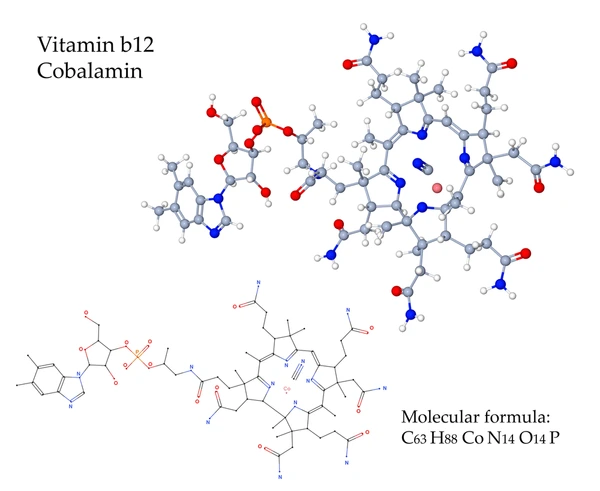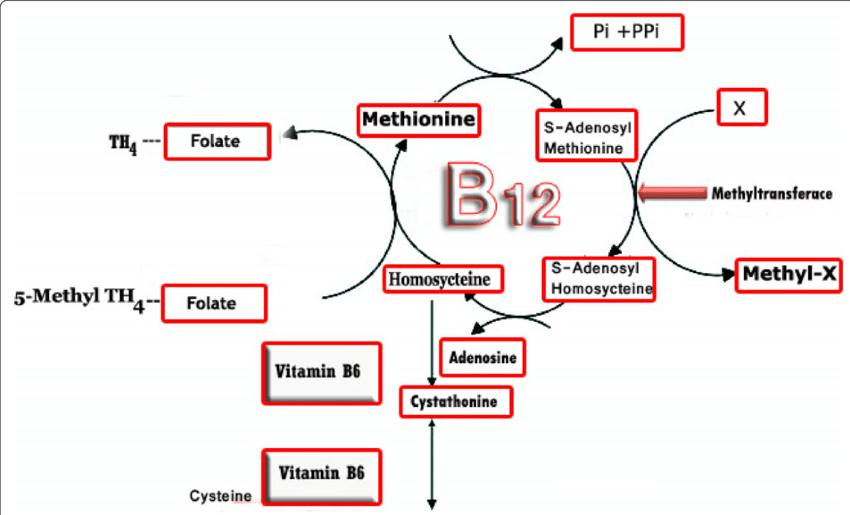It is not uncommon to have a vitamin B12 deficiency, what matters more is the reason for it. While inadequate nutrition can be managed with nutrient supplementation, impaired absorption is a more major concern. Testing for a vitamin B12 deficiency is usually recommended, but it should never be done on its own. In case of a deficiency, testing Vitamin B12 with Homocysteine should be the norm and this article is going to explain the important reason why.
What is Vitamin B12?

Vitamin B12, also known as cobalamin, is a water-soluble vitamin that belongs to the B-complex family. Unlike other B-vitamins, B12 is unique in its structure as it contains cobalt, a mineral that gives it its distinctive name. Vitamin B12 is essential for the following:
- Formation of Red Blood cells
- Synthesis of DNA
- Brain Function
- Development of Brain Cells
- Energy metabolism
- Healthy Nervous System Function
How is Vitamin B12 Absorbed in the Body?
Vitamin B12 is not produced by the human body but is obtained through dietary sources or supplements. It is synthesized by bacteria found in the digestive tracts of animals and to some extent fortified cereals and plant foods. Vitamin B12 is bound to the proteins in such foods, but in our stomach, enzymes and hydrochloric acid unbinds it into its free natural form. Thereafter, it combines with a protein called intrinsic factor to help it get easily absorbed into the small intestine.
Intrinsic factor is made by cells in the stomach lining, and it crucial to vitamin B12 synthesis where it helps the vitamin then bind to specific receptors on the surface of cells, allowing the absorption of vitamin B12 into the bloodstream. Once absorbed, vitamin B12 is bound to a carrier protein called transcobalamin II (TCII) which delivers it to delivered to cells throughout the body, where it plays a crucial role in various biochemical reactions.
Why Vitamin B12 Should Not Be Tested Alone
In humans, only two enzymatic reactions are known to be dependent on vitamin B12 or cobalamin . One of which is the conversion of an amino acid homocysteine to methionine, the other is the conversion of methylmalonic acid to succinyl Coenzyme A. Thus, vitamin B deficiency or folic acid can lead to increased levels of both, homocysteine and methylmalonic acid.
Studies have found out how methylmalonic acid and homocysteine levels can be early markers for tissue vitamin B12 deficiency, even before blood serum manifestations of low vitamin B12 can occur. This is the main reasons why it is always better to get tested for serum homocysteine as well. Research has also found, how methylmalonic acid and homocysteine are more sensitive in the diagnosis of vitamin B12 deficiency than measurement of serum B12 levels alone making the relationship of vitamin B12 with homocysteine an important one for diagnosis.
The Relationship of Vitamin B12 with Homocysteine

Homocysteine is a sulfur contining amino acid and more of a waste product produced as part of the process of methionine metabolism in the body. High levels of homocysteine could indicate metabolic disorders marked by factors like high blood pressure, high cholesterol, and obesity. High levels of homocysteine in the blood, a condition known as hyperhomocysteinemia, can also be a cause for concern. But what keeps the levels of homocysteine in check? It is B Vitamins of course which is why vitamin B12 with homocysteine is a better way to check for a dificiency
There is a definite relationship between B vitamins with Homocysteine. It is B vitamins, namely vitamin B12, that acts as a cofactor breaking down homocysteine in the blood, converting it into two substances:
- Methionine, an essential amino acid, and antioxidant that synthesizes proteins.
- Cysteine, a nonessential amino acid synthesized from methionine. It contributes to decreasing inflammation, enhances immune cell communication and increases liver health.
More about Homocysteine in Relation to Metabolic Disorders
Elevated levels of homocysteine can cause several issues such as increased blood clotting, coronary artery disease, heart attacks and even stroke. Moreover, high levels of homocysteine can also indicate several other underlying issues. High levels of homocysteine may indicate:
Cardiovascular disease risk: Numerous studies have linked elevated homocysteine levels with an increased risk of cardiovascular diseases, including heart attacks, strokes, and peripheral artery disease. High homocysteine levels are thought to contribute to damage to the inner lining of blood vessels, promoting atherosclerosis (narrowing and hardening of arteries).
Vitamin deficiency: Elevated levels indicate B-vitamin deficiency, especially vitamin B-12
Genetics: Some individuals may have genetic variations that impair the metabolism of homocysteine, leading to higher levels in their blood.
Kidney disease: Reduced kidney function can interfere with the clearance of homocysteine from the body, leading to higher levels in the blood.
Hypothyroidism: An underactive thyroid gland or hypothyroidism can contribute to elevated homocysteine levels.
Alzheimer’s: A study over a 20-year period found how elevated blood serum total homocysteine is a modifiable risk factor for development of cognitive decline, dementia, and Alzheimer’s disease in older persons.
Most importantly, besides high homocysteine levels indicating a risk for heart attack or stroke, it is also a marker for increased risk of the following conditions:
- Homocystinuria (A rare disease when your body can’t process methionine).
- Metabolic syndrome
- High blood pressure
- High cholesterol
- Diabetic retinopathy
- Psoriasis
- Medication
Risks Associated with Unchecked Levels of Homocysteine
Without treatment, elevated homocysteine levels can lead to severe health putting you at risk of the following conditions:
- Blood clots.
- Dementia.
- Heart attack.
- Heart disease.
- Osteoporosis.
- Stroke.
When To Check for Homocysteine
Usually, the signs of elevated homocysteine coincide with the signs of a vitamin B12 deficiency which are:
- Fatigue and weakness: B12 is essential for energy production, and a deficiency can lead to persistent fatigue and weakness.
- Pale or jaundiced skin: Insufficient red blood cell production due to B12 deficiency can result in pale or jaundiced skin.
- Neurological symptoms: B12 deficiency can manifest as neurological problems, including numbness or tingling in the hands and feet, difficulty walking, and memory problems.
- Mood changes: B12 plays a role in the synthesis of neurotransmitters. Low levels may contribute to mood swings, depression, or anxiety.
- Cognitive decline: Long-term deficiency may lead to cognitive decline, affecting memory and concentration.
- Megaloblastic anemia: A type of vitamin deficiency anemia that happens when you don’t get enough vitamin B12 and/or vitamin B9 (folate).
- Other symptoms: Tongue or mouth soreness, dizziness, muscle weakness, depression, psychosis, and possible myocardial infarction (heart attack).
How to Reduce Homocysteine
It is none other than Vitamin B intake that can bring down your levels of homocysteine which makes this the most significant association of vitamin B12 with homocysteine. However, there is also much you can do to keep homocysteine levels in check through lifestyle management. These are:
- Supplementation of Vitamins B12, B6, folic acid (as prescribed by a doctor)
- Quitting smoking.
- Consuming less than 2,300 milligrams of sodium daily.
- Exercising three to five times weekly.
- Managing your blood pressure.
Sources of Vitamin B12:
Meat: Red meat, chicken, turkey, fish, and seafood (Salmon, trout, tuna, and shellfish are excellent sources)
Dairy Products: Milk, cheese, yoghurt, eggs, (especially the yolk)
Fortified Foods: Some plant-based foods like cereals, plant-based milk (soy, almond, etc.), Shitake mushrooms and nutritional yeast are fortified with B12.
Normal Levels of Vitamin B12 And Homocysteine
- Vitamin B12: A normal range for vitamin B12 varies depending on the reference levels of the lab. However, a normal level of vitamin B12 is generally between 190 and 600 picograms per milliliter (pg/mL). A level below 200 is generally considered low. Vitamin B12 levels above 800 pg/mL are considered high and can indicate complications like liver disease, renal dysfunction, or leukemia.
- Homocysteine: In a healthy person, homocysteine levels are around five to 15 micromoles per liter (mcmol/L). More than 50 mcmol/L can put you at risk of all of the issues associated with high homocysteine.
It is important to note that having high homocysteine levels does not necessarily mean a person will develop health problems. Non-medical reasons for elevated homocysteine can include aging, smoking, being a male, and excess alcohol consumption. But, since it can be a risk factor and an indicator for potential health issues, monitoring and managing homocysteine levels are important for individuals with vitamin B12 deficiencies, and with known risk factors of heart disease or stroke.



